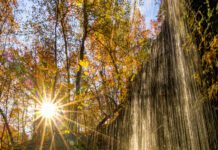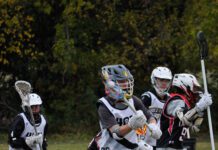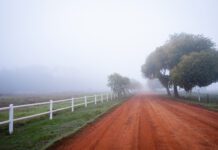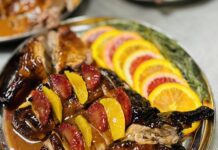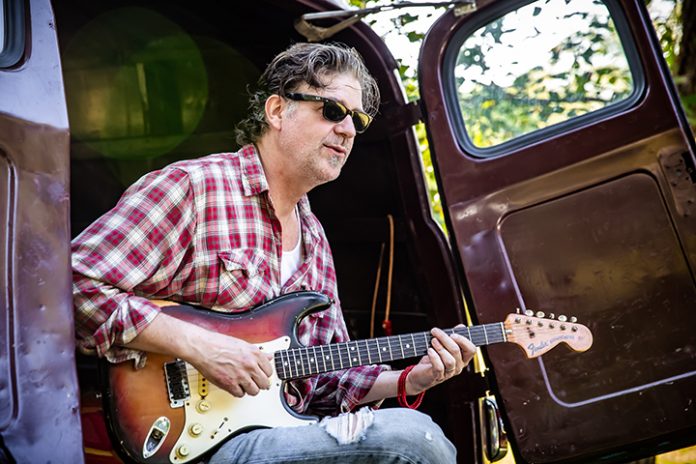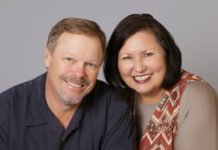It’s hard to believe that a new CD and LP – The Brad James Band at Fellowship Hall (Horton Records) – is the first-ever solo offering from the Tulsa guitarist, vocalist and songwriter. As he puts it, “I guess you could call it kind of a debut.”
The operative term there is “kind of.” For nearly three decades, beginning with his work as a founding member of Medicine Show, James has been a force in Oklahoma music. During a stretch in the early ’90s, Medicine Show and fellow act the Red Dirt Rangers were the leading – and sometimes, it seemed, pretty much the only – exponents of Red Dirt music, that earthy amalgam of country, folk, rock and blues originating in Stillwater and continuing to this day.
James is also known for his work with singer-songwriter Brandon Jenkins, another act often put under the Red Dirt umbrella. The Fellowship Hall album is dedicated to Jenkins, who died last year following complications from heart surgery.
“We played a lot together over the years,” James says. “There was a big chunk of time in the middle when he was gone to different states, to Austin and Nashville, but I was back playing with him again as his lead guitar player. I’m not positive, but I think I played the very last show he ever performed. We did a Texas run, three nights with the full band and then he and I as a duo in Fort Worth on the last night.
“We drove home that night. We couldn’t sleep because he was coughing so bad, which I think was heart-related, so we just looked at each other about 5 a.m. and said, ‘Man, we’re not getting any rest. Let’s go home.’ So he dropped me off at my driveway and went back to Nashville, and that was the last I ever saw of him.”
The spirit of Jenkins hovers over Fellowship Hall, along with the musical ghosts of Medicine Show and the late Tulsa-based piano player David Tanner, who played several engagements with that band. The disc begins with the Tanner-penned “No Dress Rehearsal,” a bluesy lament about how, “when you’re the star of the show, there ain’t a lot of time to rehearse.”
On Fellowship Hall, the Medicine Show member and Jenkins’ lead guitarist is, finally, the star of the show. It’s been a long time coming, but the timing seems very right – for at least a couple of reasons.
One has to do with format.
“I really wanted to do a [vinyl] album,” James says. “It’s been kind of a lifelong goal of mine. But when we were in Medicine Show, the technology just wasn’t there. CDs were as far as you could go. Because albums are so much more popular now, you can afford to get one made.”
And if that reason seems slightly retro, the other reason is just the opposite, reflecting a way of recording music undreamt of when vinyl was king.
“My friend Chris Combs, who’s a wonderful musician, engineer and producer,” James says, “was doing a Kickstarter [for his first solo album, Combsy]. My wife, Ann, was looking on Facebook, and she said, ‘Hey, Chris Combs has a reward tier here on his Kickstarter that says for this amount, he’ll produce your next record. Honey, wouldn’t that be cool?’
“I’m sure I just grumbled something about ‘Oh, I don’t need to make a record’ – like I’ve been doing for years. And then at one point, she said, ‘Honey, there’s only one day left on this Kickstarter. You really should call him and talk to him about this reward tier.’ So I did.
“I can’t say enough about how instrumental he was in being patient with my vision but knowing exactly how to get there. He said, ‘What do you want this to sound like? Give me albums that are important to you.’ I looked back through my collection, at what was influential to me, and I realized that just about anything Tom Dowd ever did, I liked.”
“I really wanted to do a [vinyl] album,” James says. “It’s been kind of a lifelong goal of mine.”
Dowd, the legendary engineer and producer for Atlantic Records, recorded a staggering variety of acts, ranging from Ray Charles and Aretha Franklin to Eric Clapton and the Allman Brothers Band (one of James’ personal favorites). What James likes most about Dowd’s work is “how he had everything miked up in the recording process, how he mixed it. So I’d get my hi-fi set up where it sounded right to me and I’d listen to Aretha records, and Derek and the Dominos, and I’d say, ‘OK, the conga is placed over here, the tambourines are placed over here, and the kick and snare and bass sound like they’re over here.’
“Chris said, ‘OK, I get what you’re going for.’ We didn’t want to make a retro thing, but we thought, ‘Well, Tom Dowd was top-notch, and that’s a good thing to shoot for,’” he adds with a chuckle.
Equally important were the songs James chose to record, and the way they’re sequenced on the disc. After waiting so long to do a real vinyl LP, he was determined get everything right.
“I started thinking about it as an experience, the tactile experience I grew up with – how the album starts, how Side 1 ends, and how you go flip it, clean it, and how Side 2 starts and ends,” he says. “I wanted as many of my own songs on it as I could get, but I had a few of my friends’ songs that were really important to me, that I really enjoyed, that spoke to me. There were three songs – one of mine and two friends’ songs – that just didn’t make the cut because they didn’t fit the experience, the ride.”
When it came to the LP, there were also time restrictions.
“The mastering engineer told me that you didn’t want to have more than 20 minutes per side or the music starts to sound different – the fidelity,” he says.
So one of the tracks he and the band cut, “Together” (written by steel-guitarist Cary Morin, who also appears on the album), ended up as a bonus number on the CD version of Fellowship Hall.
“We couldn’t cram it on one side [of the LP] or the other, and it really didn’t fit in my sequencing idea,” James says.
With encouragement from producer Combs and Horton Records president Brian Horton, James put it on the CD – not at the end, like most bonus tracks, but in the middle.
“It just seemed like a good place,” he says.
Some of the songs on Fellowship Hall, he adds, have been around since the Medicine Show days. Those include three written with Mike McClure “around ’95,” just about the time McClure’s band the Great Divide was beginning to assert itself as a major Red Dirt act.
“You know, when it came time to choose the songs we were going to record, it was like trying to write the Great American Novel,” James says. “It was difficult to expose yourself that much.”
But it worked, and James is quick to credit others for helping make it happen.
“I really can’t say enough about my band members,” he says. “I thought they not only did a fine job of playing, but really got way inside those songs. They were musically and emotionally supportive. And Chris Combs was genius in his guidance, editing, and mixing. I would love to get to do this with all of them again.”
For more information about The Brad James Band at Fellowship Hall, go to hortonrecords.org.


